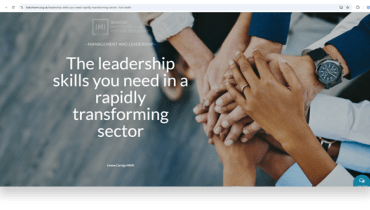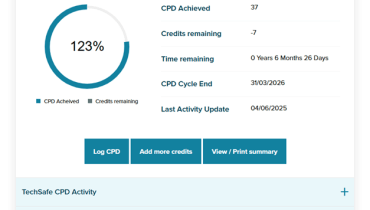Growing talent

Ian Luxford & Amber Orchard-Webb, The Motivation Agency
In a world that is ever-changing, no-one can afford to stand still with their skills and knowledge.
Human Capital Theory has been around for many decades. It is not talked about much today though its message is as relevant as ever. This message is that people are an asset that does not need to depreciate – people can appreciate in value, given the right treatment.
Specialists in Human Capital also have ways of putting financial values onto workforces and individuals – they can tell you what someone’s experience, abilities and attitudes add up to – what they could be worth to an employer.
Another way of looking at the value of a workforce is Investors in People. This is a popular initiative designed to help organisations deliver on their goals by managing their people in the most effective ways – making it clear what is expected of them and making sure that they have the capability to deliver.
In its heyday, the 1990s, Investors in People had the unusual distinction of being a voluntary government initiative that was supported by all the major political parties, the trades unions, the employers’ associations (Confederation of British Industry, Institute of Directors) and many trade/professional bodies.
It appears that everyone wants people to develop.

When we get people development right, it can have a big impact. Another thing that Investors in People popularised was the idea of evaluation – if we measure the success of our people’s development, we can see if it is helping people to add more value.
So, if developing people is something which enjoys widespread buy-in, and it is possible to see the financial impact it has, why aren’t more organisations doing it?
For some time, research has shown that the UK is way behind on workforce development. Despite the fact that it benefits individuals and the organisations they work for, it still doesn’t happen enough.
There could be lots of reasons for this. The leaders of some organisations believe that developing people is costly, that it takes up unreasonable amounts of time and that it stops “more important” things getting done. These are all perceptions.
What drives workforce development?
The reality is that, whether leaders agree with the principle of developing their people or not, acting on this principle is something else.
The culture of an organisation plays a huge part here.
Organisations that encourage and enable their people to learn, reap the benefits that it brings. If it is in the culture and part of the way an organisation operates, these benefits come through. It’s not just down to the organisation though. More is needed, from individual employees and from those who support and guide them.
Individuals can and should take ownership of their development – they may still struggle though without the right input and support from their line managers.
There’s an excellent study of workplace learning that identified a management style termed learning-oriented leadership.
The researchers observed leaders who were great at promoting learning at work effectively and found several common activities:
- Spotting opportunities for people to learn
- Promoting career development
- Active coaching
- Knowledge sharing
- Challenging reluctant learners
- Promoting innovative thinking
- Role modelling
In other words, being a great manager.
It shouldn't be an onerous task for managers to support their people’s development; it should be what they do anyway. Managers do not have to be learning specialists – they can be learning GPs – knowing enough and caring enough to guide their people to the right solutions.
Of the actions that learning-oriented leaders take, we think coaching is one of the most impactful. It is a critical skill for managers – and this is how we define it:
Unlocking people's potential to maximise their own performance.
Coaching is powerful because it encourages people to take ownership of their development – ensuring that learning that individuals choose to opt into and move forward with actually happens – therefore making it sustainable.
Whether you're already actively coaching individuals, or you've had the benefit of working with a great coach yourself, you likely have a view of what strong coaching looks like. Let's just remind ourselves of some of the things a true coach does:
- Listening attentively
- Asking powerful questions that make the coachee think
- Showing genuine interest and developing rapport
- Being empathic and self-aware – continuously reflecting to make sure potential biases are kept out of coaching conversations
Learning for managers
We’ve seen what learning-oriented leaders and great managers can do for their teams. It's important we look at the managers themselves too.
The world is rapidly changing and evolving, as is the motor industry. We all need to continue to learn – to give ourselves a chance to keep up! No-one has reached a point where they can't learn more about something or improve or change the way they do something.
A recent article by Emma Carrigy for the IMI titled 'The Leadership Skills you need in a rapidly transforming sector' illustrates how important it is for managers in the industry to continually update and refine their skills, in multiple areas. In it, Emma says "Exclusive IMI insight highlights that while the total number of management roles is projected to remain broadly stable, the types of roles, where they are needed, and the skills they require are shifting sharply".
There’s lots more – this article is well worth the 5 minutes it takes to read.

To become better managers, to help others learn and to be role model learners - as well as role model workers, to be able to adapt to change and to be future ready, managers need to be prepared to own their personal learning.
Many organisations provide access to vast amounts of learning opportunities, things like online courses, face-to-face courses, webinars and much more. We should be encouraging ourselves and managers within the sector to seek out learning opportunities both within and outside the organisation. Learning opportunities from outside your organisation can help bring a new perspective – new ideas, a fresh set of eyes.
It may be that managers want to learn something completely different to their 'job role' - this is still their own personal development and should be celebrated as such. There are so many transferable skills that we learn that sometimes don't seem so obvious from the outside.
By being open about their own personal learning, sharing their own experiences on what they are doing, managers will encourage and inspire their teams, helping show the benefits of personal development.
Reflection and continual development
What else can we do as managers or individual learners, to increase our value?
We become effective learners when we build reflection into our learning. In a sense, reflection is exercise for the brain. The brain requires methodical reflection in order to build and strengthen its neural connections. Writing down these reflections can also help as it slows the thinking process down allowing what has been learned to really settle in the brain. It may be that we don't ever go back to what we've written but the practise of doing it in the first place can strengthen the learning.
Imagine for a moment a field with long grass, you walk across the field and you create a pathway. Now, the grass will slowly bring itself back to standing unless we walk that path again.
If we learn something for the first time, we walk that path, reflection is going over that path again, and again. By practising what we learned we stamp down that grass a bit more, and further reflection stamps it even further. The power of reflection keeps that path open. A recent experience of a rapid diagnosis by a very experienced technician brought this into sharp focus. While his colleagues were scratching their heads as to why a vehicle wouldn’t start, he drew on his years under bonnets – and the discipline he had applied of making a simple note of everything he spotted. He never needed to refer to his notes – the act of writing them down consolidated his learning. And he rectified the fault instantly.

What else can we do that is particularly relevant for the motor trade?
Situated learning is learning that connects learning to real tasks straight away, providing a deeper, more practical understanding of the topic. The learning takes place within the physical or virtual environment where the knowledge or skill will be applied thereby helping learners gain a meaningful understanding.
Learning will have an impact in an organisation when it is embedded in the culture – not when it's an afterthought, or a tick box exercise. Initiatives like 'Learning at work week' are a brilliant way to get people talking about learning and giving it a focus. They don’t change anything in the long term though. It's more important that we create and embed a culture of consistent learning to drive positive change in how people view learning. Getting our managers to become learning-oriented leaders can be the start to driving this change.
Continuing Professional Development gives us a simple, informal structure for supporting our learning – it makes us more aware of what we're learning and where any gaps might be, importantly it makes informal learning more explicit, promoting meaning making.

The IMI’s CPD system is a brilliant tool that helps IMI members to reflect on their learning and be conscious of how it changes what they can do. We commend it to all IMI members – it is easy to use, takes very little time and helps you to see the value you are getting from your learning.
Above everything, if you’re keen to move forward it’s not just the learning that will help you – it’s being aware of your learning and how you apply it.
The Motivation Agency are employee engagement and training specialists, who develop solutions to promote success, productivity and happiness across employer organisations of all types.
i Eraut, M., & Hirsh, W. (2010). The significance of workplace learning for individuals, groups and organisations (Publisher's version). ESRC Centre on Skills, Knowledge and Organisational Performance (SKOPE).
ii Wallo A, Kock H, Reineholm C and Ellstrom P (2022) ‘How do managers promote workplace learning?: learning-oriented leadership in daily work’, Journal of Workplace Learning, 34(1):58–73, https://hdl.voced.edu.au/10707/617463.
iii https://tide.theimi.org.uk/leadership-skills-you-need-rapidly-transform…
iv https://www.learningatworkweek.com/

